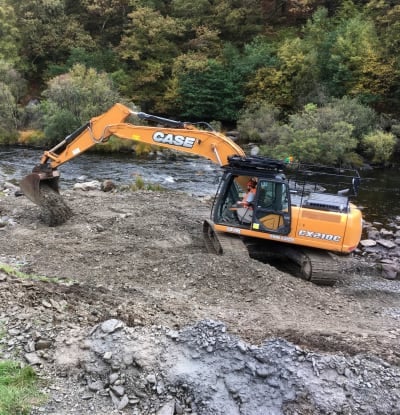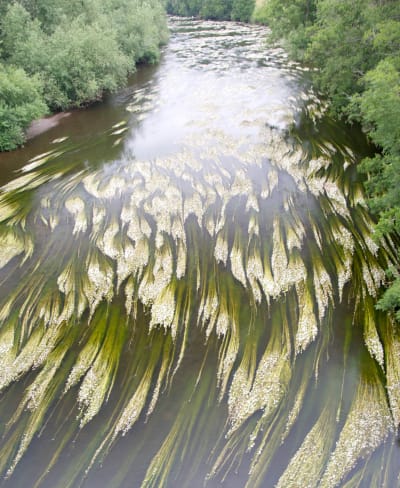From November 15th 2021 we will be running a fundraising telephone campaign, which will run into the early part of 2022.
Callers from Buffalo Fundraising Consultants will be contacting people and asking them to support the Foundation’s efforts to restore and protect the two rivers.
The callers will try to answer as many questions as they can but if you have received a call, please feel free to contact us if you have any additional questions or queries about this campaign.

It should go without saying that anyone with an affinity with a river wants to see it in good health.
Anglers and wildlife enthusiasts are amongst those most passionate about ensuring rivers are clean have good ecology, an abundance of wildlife and healthy fish stocks. That is also, of course, the Foundation’s vision and our objective for two of the UK’s most famous rivers, the Wye and Usk.
Yet the ecology and fish species of both rivers are in trouble.
The Wye has just suffered what is likely to be its lowest salmon rod catch ever recorded. Fewer coarse fish have been reported this year and there have been noticeable changes in the river’s ecology, such as the disappearance of the once plentiful ranunculus beds.
The Usk was declared earlier this year to be the worst performing SAC river in Wales for phosphate levels. While trout numbers in upper reaches remain good, the Usk’s salmon populations are dwindling. This is all the more poignant for a river whose Welsh name translates as “abounding in fish.”

Despite this desperate situation and the flood of negativity dominating social and mainstream media over the state of the UK’s rivers, all is not lost. We know that projects to tackle the root causes of the problems can and will deliver positive results. Rivers and their wildlife have a remarkable ability to recover quickly and completely if the limiting factors are resolved.
For example, juvenile salmon numbers in the Wye catchment have been boosted significantly by two recent Foundation projects. The first, an initiative to restore gravel in the Elan increased juvenile numbers twentyfold in that river over just four years. Meanwhile, on the river Lugg, a single fish pass we built in 2020 has opened up miles of pristine spawning and juvenile river habitat. Salmon spawned in this previously difficult to access section just one year later and electrofishing surveys found juveniles throughout.
 The positive effects for salmon anglers of these two projects will be felt in the decades to come, when the additional adult fish that result from them return to the river. However, for the river and its species and habitats, this shows that actions taken now will begin to have an impact almost immediately.
The positive effects for salmon anglers of these two projects will be felt in the decades to come, when the additional adult fish that result from them return to the river. However, for the river and its species and habitats, this shows that actions taken now will begin to have an impact almost immediately.
The worst effects of the issues facing both rivers today are felt most acutely in their middle and lower reaches. Algal blooms, extremes of flow and poor water quality are all affecting the ecology and fish stocks. This is especially the case for (but not limited to) the Wye’s coarse species. If nothing is done to resolve these issues, the Wye’s barbel populations will probably go the same way of other rivers in the UK and become an increasingly difficult creature to catch.
In the past year politicians and Governments have been waking up to these problems. They are beginning to realise just how much people care about the country’s rivers and how much anger there is surrounding their demise. However, funding to resolve them will be slow and even harder to come by than in the past, especially as we emerge from the COVID crisis and with European environmental funds no longer available to us. It will therefore fall on those that care about rivers to contribute a larger share of the cost of turning their fortunes around.
And we need to act fast if the Wye and Usk are not going to decline further. While volunteers are picking up much of the extra monitoring required (but not all) and various, newly-formed pressure groups are taking care of the campaigning, there are actually very few organisations resolving the issues on the ground and in the water. This needs specific skills and expertise, which the Foundation has and is already using to take on these challenges. However, the extent and effect of our work is always limited by funds, which is why we need your support.
We already have people willing to support if others do too. For example, providing we can raise £20,000 to cover 10 years of running costs, one generous landowner in the Usk has pledged £50,0000 towards specialist scientific equipment that will enable us to identify the causes of the Usk’s water quality issues and, just as importantly, help us improve the effectiveness of the projects we are running in this catchment.

On the Wye, we have been making a good start at tackling the severe algal blooms. After blanket denial, the agricultural sector and major food suppliers have, in the last few weeks faced up to the fact that they are a large part of the river’s problems. This is a crucial start. We now need to develop and deliver effective remedies with farmers and businesses to reduce drastically the amount of nutrients entering the river. This will not be a quick fix but we already have individuals who are prepared to donate up to £15,000 in match funding next year to help resolve the algal blooms. Solutions to the excess nutrient problem exist and we can work together with farmers and businesses to deliver them, providing we have the funds.
Anything you can give towards this work is multiplied further by our ability to approach other funding sources to back projects to restore and protect the rivers. Every £1 you give can be turned into up to £20 in match funding from other sources. In other words, your donation will have a far larger impact than its face value.
Whatever you enjoy doing next to a river, whether that is catching a trout, watching a kingfisher, a dipper or a sand martin, seeing a mayfly hatch from the margins or simply taking in beautiful surroundings, we hope that you will help us in restore and protect the wonderful Wye and Usk.
Thank you for your support.
Share this page
The Wye and Usk Foundation
The Right Bank, The Square
Talgarth
Brecon
LD3 0BW
The Wye & Usk Foundation is a charity registered in England and Wales (no. 1080319).